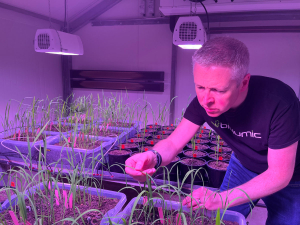AgriZeroNZ invests in methane-reducing tech
A US-based company developing a vaccine to reduce methane emissions in cattle has received another capital injection from New Zealand’s agriculture sector.
 Jason Wargent, founder and chief science officer of BioLumic, observing rice seedlings under UV Light.
Jason Wargent, founder and chief science officer of BioLumic, observing rice seedlings under UV Light.
AgriZeroNZ, a joint venture fast-tracking emissions reduction tools for farmers, is pouring $5 million in a biotech company to develop a low emissions farm pasture with increased productivity gains.
Founded in New Zealand, BioLumic is internationally acclaimed for its unique and proprietary UV Light Treatments which are applied to seeds to regulate their genetic expression and unlock their natural genetic potential. These treatments have been found to significantly improve plant performance across 12 crops including corn, soybeans and rice - driving double digit yield gains, improved quality and enhanced immunity to pathogens.
AgriZeroNZ funding will enable BioLumic to apply its technology to ryegrass, the most common forage pasture on New Zealand farms, with a goal to increase fat content and subsequently reduce methane emissions from animals that consume it.
AgriZeroNZ chief executive Wayne McNee says this could deliver a simple solution to reduce emissions on New Zealand’s predominantly pasture-based farms, to help meet the global customer demands for emissions reduction, protect trade agreements, and achieve New Zealand’s climate goals.
“Pasture is the foundation of the business for Kiwi farmers, so a pasture solution to curb methane and boost productivity will be an important option in their toolkit to reduce emissions.
“BioLumic’s work is an exciting prospect to help secure the future of farming in New Zealand with the very thing that makes our agricultural sector unique and drives our competitive edge today - high quality grass.
“They have achieved promising results on ryegrass to date. We’re looking forward to seeing how it progresses,” McNee said.
Animals with high-fat diets have lower methane emissions, such as grain-fed cattle in more intensive barn farming operations overseas. Studies* have found that a 1 per cent increase in lipids (fat) content of feed will reduce methane emissions by ~5 per cent. BioLumic is targeting a 2-3% increase in the lipids content of ryegrass to drive methane reduction by over 12 per cent.
Based in Palmerston North and with offices in the United States, BioLumic was founded in 2013 by Dr Jason Wargent, the company’s chief science officer and a Professor in Plant Biology at Massey University.
Funding from AgriZeroNZ was part of BioLumic’s capital raise to enable application of its suite of products to address major sources of greenhouse gas emissions.
“We’ve developed light recipes from billions of potential options that, with a precise application, can significantly increase plant performance across a range of crop varieties and growing conditions,” Wargent said.
“We’re confident we can achieve similar results in ryegrass with a focus on reduced methane, and we’re really pleased to be working with AgriZeroNZ to develop this important solution for New Zealand to put farmers at the forefront of low emissions pasture farming.”
Wargent said the company is targeting wide scale use from 2027, with reduced regulatory barriers expected from the light treatment approach which will support a faster speed to market.
This is the sixth major investment by AgriZeroNZ to accelerate the development of emissions reduction tools and technologies for Kiwi farmers, having committed over $22 million to date.
Other investments include funding for a methane inhibiting bolus, novel probiotics, New Zealand research for a methane vaccine and inhibitor, and construction of a greenhouse gas testing facility.
McNee said the JV is aiming to have two to three emissions reduction tools in widespread use by 2030.
“There is a very real and very disruptive risk to our dairy and meat sectors from the need to reduce emissions but there is also a very real opportunity to stay among the most efficient producers of dairy products and meat in the world if we can get the right tools to farmers,” McNee says.
The Meat Industry Association of New Zealand (MIA) today announced that Chief Executive Officer Sirma Karapeeva has resigned from the role.
The winners of the 2026 Hawke’s Bay/Wairarapa Dairy Industry Awards were announced at the annual awards dinner held at Copthorne Solway Park in Masterton on Thursday evening.
Environment Southland is welcoming this week’s decision by the Environmental Protection Authority (EPA) to approve the release of Blaptea elguetai, a leaf‑feeding beetle that will help control the highly invasive Chilean flame creeper.
This March, the potato industry is proudly celebrating International Women’s Day on 8 March alongside the International Year of the Woman Farmer, recognising the vital role women play across every part of the sector — from paddocks and packhouses to research, leadership, and innovation.
Fruit trader Seeka posted a record profit and returns to shareholders in 2025.
Recent weather events in the Bay of Plenty, Gisborne/Tairawhiti, and Canterbury have been declared a medium-scale adverse event.

OPINION: A mate of yours truly reckons rural Manawatu families are the latest to suffer under what he calls the…
OPINION: If old Winston Peters thinks building trade relations with new nations, such as India, isn't a necessary investment in…